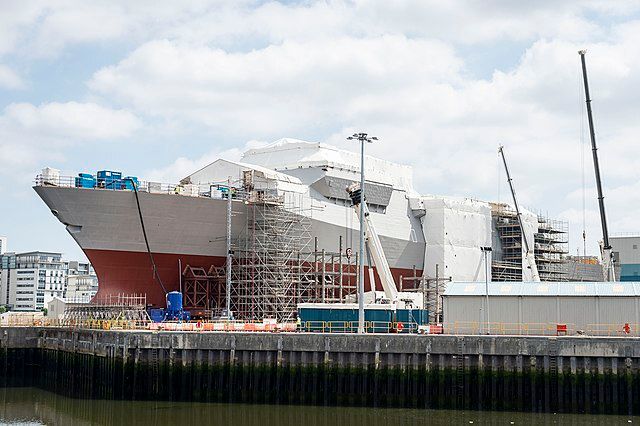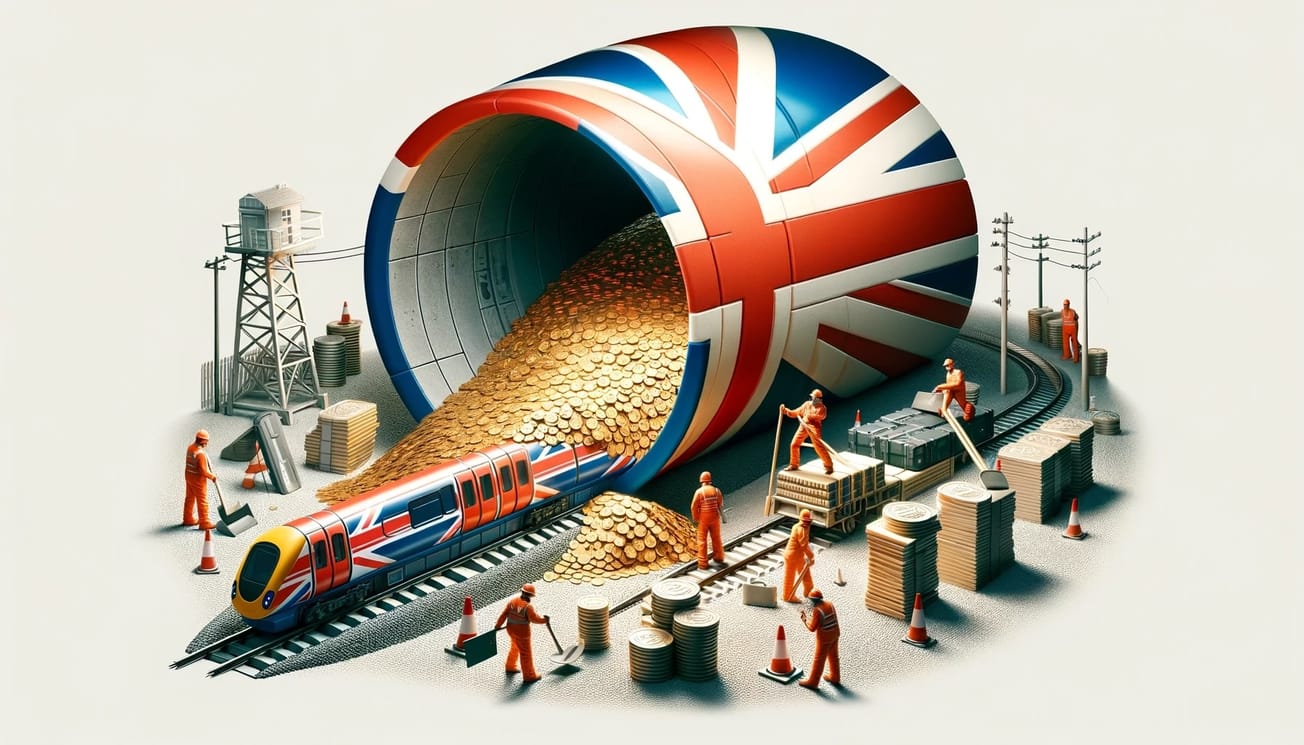

+ The topic of Scotland breaking from the U.K. remains in play 10+ years after an unsuccessful vote in the 2014 referendum, but stars would need to align for the Scottish National Party (SNP) to make another push for independence, and for it to succeed.
+ In the wake of Brexit, a global pandemic, and growing disagreement with Westminster, support for independence among Scottish voters is trending upward, but current SNP party antics make polling unreliable.
+ The Scottish shipbuilding industry is likely to be heavily impacted if the country becomes independent, as it would lose out on complex warship contracts with the U.K., and, at least initially, on other defense-related naval projects originating from the U.S. due to ITAR restrictions.
+ Income per capita in Scotland would dip between 6.3% and 8.7%, which along with debt inheritance would impact the country’s ability to rejoin the EU. This, along with harsh foreign competition, would make it difficult to obtain contracts from European nations.
+ Time would be the industry’s biggest problem: could Scottish shipyards survive the years it would likely take to spin back up foreign shipbuilding contracts following independence?
The Scottish National Party’s (SNP) leader, Humza Yousaf, recently stated at an SNP conference that if the next general election won a majority of the seats in Scotland, he would press Westminster to allow for a second referendum on the country’s independence. This prompted headlines across the U.K. to speculate whether Scotland will become independent, and what will happen if it succeeds. Domestically, one of the major voter concerns around independence is how the military would operate in an independent Scotland. This prospect can be examined through the lens of shipbuilding and how Scottish shipyards would fare in such a scenario. Following independence, the Scottish shipbuilding industry’s UK contracts would most likely evaporate, at least as far as warships are concerned. A subsequent turn to the European market, whether or not Scotland votes or is even able to join the European Union post-independence, is unlikely to bear fruit, at least for some time.
Support for Independence: Then and Now
The first referendum on Scottish independence occurred in 2014, with voters expressing strong concern about issues like the military and economy. This apprehension ultimately led to 54% of voters choosing to remain a part of the United Kingdom. Predictions prior the referendum were stating it would “come down to the wire.” This was in part due to a lowered voting age from 18 to 16, increasing the amount of voters for the ‘independence’ side, as 71% of those aged 16-17 voted to leave the U.K. Along with the lowered voting age, 85% of those eligible to vote turned out, which was unheard of.
In the decade since the referendum, the U.K. as a whole has witnessed substantial change across a wide variety of areas, most notably in its decision to leave, and subsequent departure from, the EU, as well as the national response to the Covid-19 pandemic. According to the British Social Attitudes, an organization that has been tracking social and political attitudes via Social Attitude Surveys for decades, 52% of Scottish people surveyed in 2021 stated they would want independence. This is 23% more than when the question was asked in 2012, shortly before the referendum. Among the factors driving the desire to leave the U.K. is a growing dissatisfaction with Westminster and specifically policies being implemented by the House of Commons and House of Lords that either negatively affect Scotland or ignore Scotland. Of those who voted in 2014, 74% of Scottish people that voted to leave the Union cited this as a primary reason. Based on this and the clear increases over time in the percentage of subjects who would vote for independence, if future circumstances permit another referendum to occur (a discussion for another time!), it is entirely possible Scottish voters would vote to leave the U.K.
Despite this recent domestic polling displaying a support for independence, it may be unreliable, as there are ongoing disagreements and a lack of populace satisfaction with the SNP. Former SNP leader, Nicola Sturgeon, announced her resignation on February 15th, 2023, due to disputes within the party, and a few weeks later her husband, the former Chief Executive of the party, was arrested as part of an inquiry into party finances over the handling of nearly £750,000. He was later released, though the same thing happened to Sturgeon months later. The current party leader, Humza Yousaf, is heavily disapproved, with 50% believing he is doing badly and 23% believing he is doing well. This Sturgeon investigation, party disputes, and an overall disapproval of the current party leader all make polls on major issues such as independence unreliable. It may not be this year, the next five years, or the next decade, but if a referendum does take place and Scotland does choose to leave the U.K., what will happen, especially regarding core issues that are top-of-mind among voters?
Significant Risk to Shipbuilding in Scotland
In 2020, shipbuilding comprised 7% of Scotland’s marine economy’s Gross Value Added (GVA), as it contributed £262 million to the sector. This share has been on the decline, decreasing by 56% since 2011. If the industry were to lose its military contracts, its GVA to the marine economy and even overall Scottish economy is going to heavily decrease. For the Scottish shipbuilding industry, it is concerning that no one has been able to provide a firm answer as to what would become of those contracts following independence. Sturgeon, who pushed for the 2014 referendum and continued pushing for a second one throughout her time as leader, has often been quoted stating Scotland would still receive shipbuilding contracts if they were to leave the Union. Tempering this optimism somewhat, Ian King, the former Chief Executive Officer of BAE, one of the largest shipbuilding companies in the U.K., stated that the decision to produce warships in Scotland if it were independent would be entirely up to the U.K. Ministry of Defense (MOD). Less assuringly, in 2022, the Minister for Defence Equipment, Support and Technology stated no warships would be built on the Clyde, one of Scotland’s largest shipbuilding yards, if independence had been voted for in 2014. This statement is rooted in precedent: the MoD has produced complex warships solely within the U.K. since the start of the 20th century, apart from both World Wars. National security imperatives are behind this need to keep complex shipbuilding within the country, as the outsourcing of more ships would render classified information more vulnerable to data leaks. However, support vessels such as the Tide Class Tankers have been built overseas, so it is possible shipyards in an independent Scotland might still be given these smaller ship contracts.

It is therefore highly likely that if Scotland became independent, after the years of negotiations certain to follow a successful referendum vote, the country would no longer be given MoD contracts for shipbuilding. Scotland’s shipbuilding capabilities would further be limited by the requirements set forth by the US International Traffic in Arms Regulations (ITAR), which requires companies to register with it in order to handle or work with defense-related items that originate from the United States. Scotland would have to create an ITAR-related agreement between itself and the U.S., as it would be unable to remain under the umbrella of the existing UK-US agreement. Essentially, even if the MoD wanted to contract Scottish shipyards, it would be unable to on its own, as many ships contain US technology, and the UK can no longer share this with Scotland until Scotland brokers a treaty of its own with the US. This could take years, and even then defense contractors would also have to register with the US State Department, potentially extending that timeline.
Turning to the EU: Troubled Waters
If not the U.K., then, from where else can the Scottish shipbuilding industry source contracts to make up for that loss? The EU provides a potential or assumed alternative, as many of those desiring to leave the U.K. express interest in rejoining the EU. However, not only will it take years to eventually join the EU, but Scotland will first have to meet all of the administrative, political, and economic requirements that comprise the Copenhagen Criteria, the latter of which an independent Scotland will struggle most with. This is because the Copenhagen Criteria requires a strong market economy, which in Scotland’s case may be sorely battered by independence.
The uncertainty caused by the 2014 referendum led to a slightly economic decline. Were this uncertainty to replicate after Scotland voted yes to independence, it is likely the Scottish economy would fall further for an extended period. In 2017, the rest of the UK accounted for “61% of Scottish exports and 67% of Scottish imports,” displaying a large dependence on the rest of the UK for trade. If Scotland became independent, there would be an internationally-recognized border between the two countries, which would likely hike the cost of trade. It would be incredibly difficult for this large percentage of trade to change fast, but it will over time. However, until its reliance on the U.K. market is eased, the Scottish economy will decline. All of this will depend on the deal that is made between Scotland and the UK, and Scotland and the EU, but it has been predicted that the income per capita in Scotland will decrease anywhere between 6.3% and 8.7%.
Scotland would also end up taking on a percentage of the approximately £1876.8 billion in debt currently shouldered by the United Kingdom as a whole. There is no exact amount of agreed-upon amount Scotland would inherit, as it will depend on the negotiations that take place after an independence referendum. These negotiations would take time, and would be incredibly specific, focusing on certain assets, shares, repayment requirements, and more. Nonetheless, the UK government stated Scotland would be “responsible for a fair and proportionate share of the UK’s current liabilities.”
All of these factors together are likely to complicate Scottish efforts to join the EU. But even after the years of negotiations, if Scotland was able to finally join the EU, shipbuilding would likely not heavily improve. The issue is that the European market consists of a small number of companies sharing fierce competition and bid-wars. This competition ends up damaging the existing companies and discouraging new ones, pushing contracts to nations like South Korea and China, who are able to do the projects effectively at a lower cost. So, while companies operating in Scotland would be able to bid on certain contracts, it is unlikely they would be awarded many when there are other competitors at the same level in Europe that offer the same price and countries in East Asia that offer cheaper prices.
SNP Policy in a Post-Brexit UK
All of these points indicate that it is unlikely Scotland will be receiving any military contracts for quite some time following independence, and when it does, they will not be for complex and expensive warships from the UK, but simpler, support vessels. Upon subsequently joining the EU, Scotland will also struggle to receive other contracts from European nations due to foreign competition and competition from each Union country’s domestic sector. Scottish shipyards will therefore be heavily reliant on support vessel and commercial contracts. While it would eventually be needing to build up a Naval fleet of their own, the Scottish government will initially struggle to create these contracts due to its economic stuttering and debt inheritance discussions. Those within the Scottish shipbuilding industry should keep an eye on domestic politics, including the approval ratings and large disagreements within the SNP. If the stars align, and these disagreements manage to cease, Yousaf pulls the party together, and Westminster allows it, another referendum will occur. And this time, the numbers may be on the side of independence.









